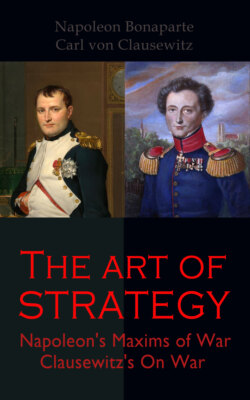Читать книгу The Art of Strategy: Napoleon's Maxims of War + Clausewitz's On War - Carl von Clausewitz - Страница 32
На сайте Литреса книга снята с продажи.
ОглавлениеMAXIM XXVII.
Table of Contents
When an army is driven from a first position, the retreating columns should rally always sufficiently in the rear, to prevent any interruption from the enemy. The greatest disaster that can happen, is when the columns are attacked in detail, and before their junction.
NOTE.
One great advantage which results from rallying your columns on a point far removed from the field of battle, or from the position previously occupied, is, that the enemy is uncertain as to the direction you mean to take.
If he divides his force to pursue you, he exposes himself to see his detachments beaten in detail, especially if you have exerted all due diligence, and have effected the junction of your troops in sufficient time to get between his columns and disperse them one after the other.
It was by a manœuvre of this kind in the campaign of Italy, in 1799, that General Melas gained the battle of Genola.
General Championet commanded the French army, and endeavored to cut off the communication of the Austrians with Turin, by employing corps which manœuvred separately to get into their rear. Melas, who divined his project, made a retrograde march, by which he persuaded his adversary he was in full retreat, although the real object of his movement was to concentrate his forces at the point fixed for the junction of the different detachments of the French army, and which he beat and dispersed, one after another, by his great superiority in numbers. The result of this manœuvre, in which the Austrian general displayed vigor, decision, and foresight, secured to him the peaceable possession of Piedmont.
It was also by the neglect of this principle that General Beaulieu, who commanded the Austro-Sardinian army in the campaign of 1796, lost the battle of Milesimo after that of Montenotte.
His object, in endeavoring to rally his different corps upon Milesimo, was, to cover the high roads of Turin and Milan; but Napoleon, aware of the advantages arising from the ardor of troops emboldened by recent success, attacked him before he could assemble his divisions, and, by a series of skilful manœuvres, succeeded in separating the combined armies. They retired in the greatest disorder—the one by the road of Milan, the other by that of Turin.
